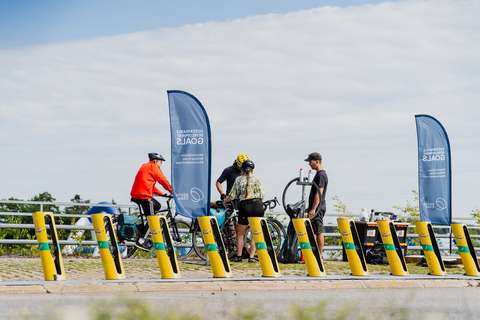The Cycle4Climate project actively promotes cycling as a mode of everyday transport
It is Espoo’s goal to become carbon neutral by 2030. At the moment, transport generates about one third of the carbon dioxide emissions in Espoo. More than half of these emissions are produced by private car use (HSY 2025). Cycling is an effective way to reduce the emissions of everyday trips. In the Helsinki Metropolitan Area, more than one third of journeys made by car within the region are less than 5 kilometres long with an average of 1.35 people in the car on trips that are commonly made by car (HSL 2024) – nowadays, biking is a viable option to short solo trips by car. Riding a bike also has positive health impacts, it is inexpensive and supports the formation of pleasant urban environments (Tuominen et al. 2025). Shared city bikes are a convenient way of cycling within the city bike range. In recent years, e-bikes have gained popularity alongside regular bikes thanks to their potential to reduce the physical strain of cycling and increase the distance travelled.
The City of Espoo is involved in the Cycle4Climate(external link, opens in a new window) project (2024–2027) co-financed by the EU Interreg Central Baltic programme. The project aims to reduce carbon dioxide emissions from transport by promoting the use of bicycles as a means of everyday mobility among working-age residents in Espoo. The project measures include the collection and analysis of mobility data, co-creation workshops with different stakeholders and a series of measures aimed at raising awareness of the city’s current cycling infrastructure and services. The measures focus especially on the Tapiola-Otaniemi-Keilaniemi area, where there is already a good range of cycling infrastructure and services, but their rate of usage could be higher. The plan is to take the lessons learned from the project and use them more extensively in Espoo in the future.
In addition to Espoo, the project involves implementing similar measures in the cities of Gävle (Sweden), Pärnu (Estonia) and Riga (Latvia) as well. These cities are cooperating with the aim of discovering effective measures together and collecting lessons learned from the implemented measures from different kinds of urban contexts. In addition to these four cities, the project includes four higher education partners – the University of Gävle, the University of Tartu, the Riga Technical University and Metropolia University of Applied Sciences – focused especially on collecting cycling data, analysing it and identifying effective measures and co-creating through design thinking.
Overview of the first year of the project
The project is carrying out a series of measures aimed at raising awareness of Espoo’s current cycling infrastructure and services during 2025–2026. The first measures were implemented in spring 2025:
- In February, an open-for-all event was organised along the enhanced winter maintenance route for cycling in Otaniemi. The event involved presenting winter road maintenance equipment and sharing information on the development measures of cycling in Espoo. In addition, participants had the opportunity to discuss the promotion of (winter) cycling with city experts.
- In April, an open event on sustainable commuting was organised in Otaniemi, where up-to-date information was shared on physically active commuting – especially by bike – to the employees and visitors of Tietokylä. The event also featured companies in the sector, and visitors had the chance to try out an e-bike.
- In May, the project organised cycling evenings for residents with Espoon Asunnot, where the participants learned about bike maintenance and servicing under the guidance of an educator.
- The Cycling Week was celebrated in the beginning of May as usual. As in previous years, the theme week featured various events around the Helsinki Metropolitan Area.
In addition, the project conducted an extensive mobility survey in all project cities simultaneously in spring 2025 under the leadership of the University of Tartu and the University of Gävle. The survey examined what kinds of factors are currently supporting or preventing commuting by bike. About 250 people from Espoo responded to the survey. The results of the survey are currently being analysed and used in the planning of further project measures, among other purposes.
The Cycle4Climate Forum brought together experts of cycling at the Alberga Manor in Leppävaara, Espoo in March 2025 for a two-day event. The event was organised in cooperation with the project partners and featured expert talks on the development of cycling from representatives of Aalto University, the network of cycling municipalities, the bicycle association Pyöräliitto, the Winter Cycling Federation and the cities of Porvoo and Espoo. In addition, the participants attended workshops aimed at solving challenges related to the promotion of cycling. The talks highlighted the importance of actively developing cycling and the crucial role and potential of various small measures in promoting concepts like sustainable mobility and bike commuting.
The project’s activities will continue in the autumn, especially in terms of corporate cooperation. The project will also be featured the Aalto University Welcome Fair event in August. You can stay up to date on the project at espoo.fi and on the project page (in English):
- https://www.espoo.fi/en/sustainable-development/cycle4climate-2024-2027
- https://centralbaltic.eu/project/cycle4climate/(external link, opens in a new window)
References
HSL 2024. Liikkumistottumukset Helsingin seudulla 2023. HSL Helsingin seudun liikenne. https://www.hsl.fi/hsl/tutkimukset/liikkumistutkimus(external link, opens in a new window).
HSY 2025. Liikenteen päästöt kaupunkiseudulla. Helsingin seudun ympäristöpalvelut -kuntayhtymä HSY. https://www.hsy.fi/ymparistotieto/avoindata/avoin-data---sivut/liikenteen-paastot-paakaupunkiseudulla/(external link, opens in a new window).
Tuominen, A., Sundqvist, H., Hukkalainen, M., Aittasalo, M. & Tuomisto, J. 2025. Driving Urban Transitions (DUT): Strengthening the climate neutrality of cities and well-being of citizens through sustainable transport and mobility. DOI: https://doi.org/10.32040/Driving.Urban.Transitions(external link, opens in a new window).
